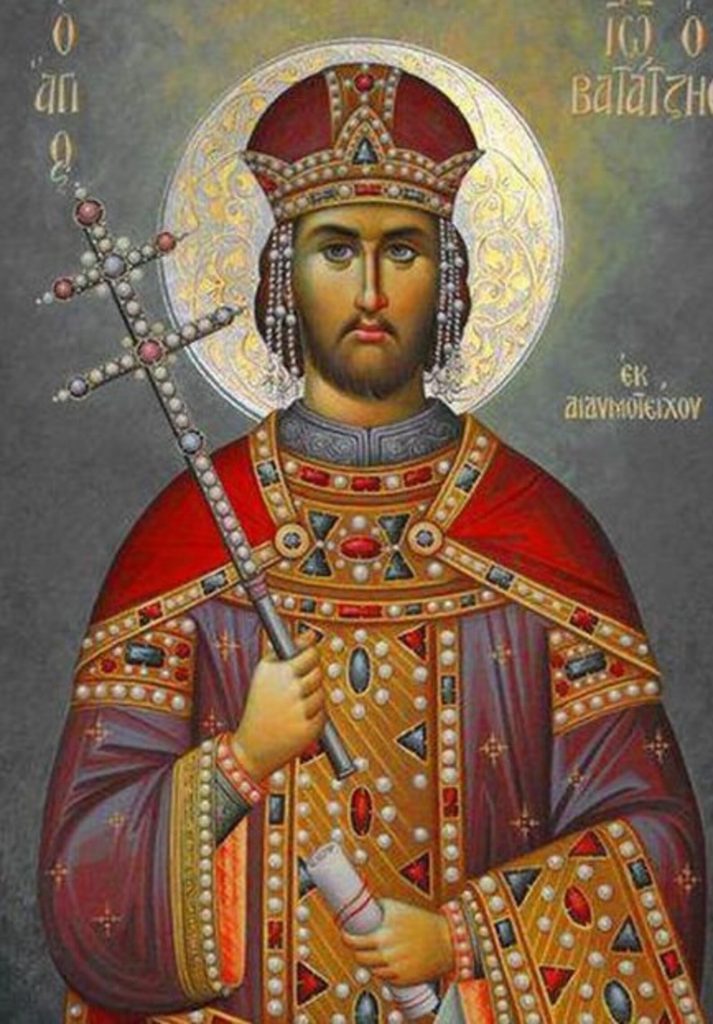The canon of the martyr, the acrostic whereof is: “Grant now that I may hymn thy grace, O martyr”, the composition of Joseph, in Tone IV.
Ode, Irmos: Through the deep of the Red Sea, * marched dry shod Israel of old, * and by Moses’ outstretched hands, * raised in the form of a cross, * the power of Amalek was routed in the wilderness.
Holy martyr, Paramon, pray to God for us.
With the illumining rays of the Spirit enlighten the heart of me who hymn thy radiant memory, O martyr Paramon, and strengthen me to abide in the laws of God.
Holy martyr, Paramon, pray to God for us.
Thou wast radiantly enriched with martyric glory, having shone forth in the beauties of martyrdom and been adorned with beauteous wounds, O Paramon. Wherefore, with faith we call thee blessed.
Glory be to the Father, and to the Son, and to the Holy Spirit.
Full of the life-creating waters of the Spirit, thou didst shed dew upon those grievously withering under the burning heat of ungodliness, O glorious one, and didst lead them to the water of peace.
Now and ever, and unto the ages of ages. Amen.
Thou hast given birth in time to the Timeless One Who became a man, O pure one. Him do thou earnestly beseech as thy Son and Lord, that He heal the temporal sufferings of my soul, O all-immaculate one.
Ode III, Irmos: Thy Church, O Christ, rejoiceth in Thee crying aloud: * Thou, O Lord, art my strength, * my refuge and foundation.
Holy martyr, Paramon, pray to God for us.
Having humbled the uprising of the enemy for Christ’s sake, thou didst destroy him and cut down his legions with the sword of patience.
Holy martyr, Paramon, pray to God for us.
Thou didst destroy the counsel of the evil one against our Faith, and suffered mightily, O martyred spiritual athlete Paramon.
Glory be to the Father, and to the Son, and to the Holy Spirit.
As a powerful warrior thou wast strengthened by divine grace, O martyr, reckoning cruel tortures to be like a dream.
Now and ever, and unto the ages of ages. Amen.
Strengthen my mind which is beset by many passions, O most pure Mother of God, that I may glorify thee as is meet.
Lord, have mercy. Lord, have mercy. Lord, have mercy.
Sessional Hymn, in Tone IV: Spec. Mel.: “Having been lifted up …”: With the patience called for by the divine precepts thou didst cleanse thy soul of defilement and attain to the perfection of spiritual athletes; for thou didst renounce sacrifice to false graven images and, emulating Christ, wast slain with a spear. Him do thou earnestly entreat on behalf of the world, O all-blessed Paramon.
Glory be to the Father, and to the Son, and to the Holy Spirit; now and ever, and unto the ages of ages. Amen.
Theotokion in Tone IV: O Theotokos, fleeing to thy divine protection after God, * I humbly fall down and beseech thee: * Have mercy, O most pure one, * for my sins have submerged my being, * and trembling O Lady, I fear the torments to come, * O pure one, entreat thy Son, ** that I may be delivered from them.
Stavrotheotokion (in place of the Theotokoion on Wednesdays and Fridays): She who in the latter days * gave birth in the flesh unto Thee O Christ, * Who wast begotten of the beginningless Father, * upon seeing Thee hanging upon the Cross, cried aloud: * “Woe is me, O Jesus, most beloved Christ! * How is it that Thou Who art glorified as God by the angels * dost now consent to be crucified by iniquitous men O my Son? ** I hymn Thee, O Thou Long-suffering One!”
Ode IV, Irmos: Beholding Thee, the Sun of righteousness, * lifted up upon the Cross, * the Church now standeth arrayed and doth worthily cry aloud: * Glory be to Thy power, O Lord!
Holy martyr, Paramon, pray to God for us.
Thy heart, protected by courage and set afire with boldness, O glorious one, considered the many and cunning tortures to be like the darts of children, O valiant minded martyr.
Holy martyr, Paramon, pray to God for us.
Seeing the sufferers slain at the command of the tyrant, the martyr Paramon received divine zeal like unto theirs, and went forth to suffering. O blessed Paramon, Christ, the Judge of the contest, crowned thee who wast mightily lacerated, mercilessly pierced with spears, and who vanquished the wiles of the enemy.
Glory be to the Father, and to the Son, and to the Holy Spirit.
Marveling at the endurance of the martyrs and amazed by their perfection, O glorious one, thou didst share in their zeal of faith and their all-honorable suffering.
Now and ever, and unto the ages of ages. Amen.
O Virgin Mary, by thy Life-bearing birthgiving thou hast brought life to all mankind slain by disobedience; wherefore, we glorify and in godliness call thee blessed.
Ode V, Irmos: Thou hast come, O my Lord, * as a light into the world, * a holy light turning from the gloom of ignorance * those who hymn Thee with faith.
Holy martyr, Paramon, pray to God for us.
Thou didst offer thyself to thy Creator as a precious gift, having suffered and vanquished falsehood, O thou adornment of the martyrs.
Holy martyr, Paramon, pray to God for us.
Thou didst demolish graven images and the temples of demons, O wise Paramon, having acquired a steadfast resolve on the rock of divine faith.
Glory be to the Father, and to the Son, and to the Holy Spirit.
Thou didst manfully wound a multitude of the demons with the wounding of thy flesh, O valiant-minded spiritual athlete. Wherefore, we call thee blessed.
Now and ever, and unto the ages of ages. Amen.
The Lord Who is equal in honor with the Father and the Spirit became incarnate from thy pure blood, O pure one, becoming a man.
Ode VI, Irmos: The church crieth out unto Thee O Lord, * ‘I will sacrifice unto Thee with a voice of praise * having been cleansed of the blood of the demons’ * by the blood that for mercy’s sake flowed from Thy side.
Holy martyr, Paramon, pray to God for us.
Thou wast not slothful during thy struggles, but wast surpassingly diligent and valiant amid thy divine suffering; wherefore, thou hast received a crown of glory.
Holy martyr, Paramon, pray to God for us.
Thou didst join the assembly of the martyrs who reached the end of their lives with zeal before thy contest, O ever-memorable one, and with them thou hast been deemed worthy to enter the heavenly bridal-chamber.
Glory be to the Father, and to the Son, and to the Holy Spirit.
Spears made thee an emulator of Christ, for, pierced thereby, O martyr, thou didst hasten to Him as one crowned, having slain the foolish with the sword of patience.
Now and ever, and unto the ages of ages. Amen.
O most immaculate one, from the temptations of life deliver me who am held fast in the night of ignorance with unseemly thoughts and am ever darkened by the malice of the enemy.
Ode VII, Irmos: In the Persian furnace the youths and descendants of Abraham, * burning with a love of piety * rather than by a flame of fire, * cried aloud saying: * Blessed art Thou in the temple of Thy glory, O Lord.
Holy martyr, Paramon, pray to God for us.
Splendidly enriched by God with the grace of healings and miracles, O wise martyr, thou dost heal those who cry aloud: Blessed art Thou in the temple of Thy glory, O Lord!
Holy martyr, Paramon, pray to God for us.
Placing all thy care in the heavens, O right glorious one, thou didst disdain the tortures inflicted upon thee, crying aloud: Blessed art Thou in the temple of Thy glory, O Lord!
Glory be to the Father, and to the Son, and to the Holy Spirit.
With the fire of thy blood thou didst consume all the wicked tinder of ungodliness, O glorious spiritual athlete; and with the dew of thy miracles bedewest those who are in the burning heat of evils, crying aloud, O right glorious one: Blessed art Thou in the temple of Thy glory, O Lord!
Now and ever, and unto the ages of ages. Amen.
Rejoice, thou who alone hast given birth to the Joy of mankind! Rejoice, O heaven and throne of the cherubim, most glorious palace of Him Who reigneth throughout all ages, O all-immaculate Lady!
Ode VIII, Irmos: Having spread his hands, Daniel closed the lions jaws * in their den; * while the zealously pious youths, * girded with virtue, * quenched the power of the fire and cried aloud: * Bless ye the Lord, all ye works of the Lord.
Holy martyr, Paramon, pray to God for us.
We all have been enriched, having acquired thee as a vigilant guardian of our souls, O much suffering one, ever lulling to sleep demonic fantasies and stilling the raging waves of the flesh and the storm of evil thoughts of those who cry aloud: Bless the Lord, all ye works of the Lord!
Holy martyr, Paramon, pray to God for us.
With the streams of thy sacred blood thou didst dye for thyself a purple robe which will never grow old, and, splendidly adorned, thou dwellest in the heavens, O blessed one, crying aloud: Bless the Lord, all ye works of the Lord!
Glory be to the Father, and to the Son, and to the Holy Spirit.
As a pure lamb, as an unblemished sacrifice, as a whole-burnt offering consumed by the embers of suffering, O wise martyr, thou didst bring thyself to Christ, the Judge of the contest, chanting: Bless the Lord, all ye works of the Lord!
Now and ever, and unto the ages of ages. Amen.
The shadow of the law and the proclamations of the prophets foreordained thee, O pure one full of the grace of God, as her who would ineffably become the Mother of our God. To Him do we all chant: Bless the Lord, all ye works of the Lord!
Ode IX, Irmos: A cornerstone not cut by hand O Virgin, * was cut from thee the unhewn mountain: * even Christ, Who hath joined together the disparate natures; * therefore rejoicing we magnify thee, * O Theotokos.
Holy martyr, Paramon, pray to God for us.
Behold! the splendid memory of the radiant passion-bearer hath shone forth, illumining with the divine Spirit the hearts of all the faithful who joyfully join chorus and bless him with faith.
Holy martyr, Paramon, pray to God for us.
Having joined thyself to the three hundred and seventy invincible martyrs, thy body doth lie with them, O martyr of Christ. With them pray thou, that we be saved.
Holy martyr, Paramon, pray to God for us.
Having passed through the arena of pain which is full of many and varied torments, and overcoming them splendidly with Christ Who conquered the world, ye dwell now in the heavens, O crowned martyrs.
Glory be to the Father, and to the Son, and to the Holy Spirit.
Thou wast taken up from the earth and received honors for thy struggles; and now pourest forth rivers of miracles upon us who honor thee and piously celebrate thy memory, O Paramon.
Now and ever, and unto the ages of ages. Amen.
Enlighten the eyes of my soul which have been darkened by the blindness of corrupting sin, O most pure Lady, Birthgiver of God; for thou art the help and enlightenment of the faithful, O pure one.
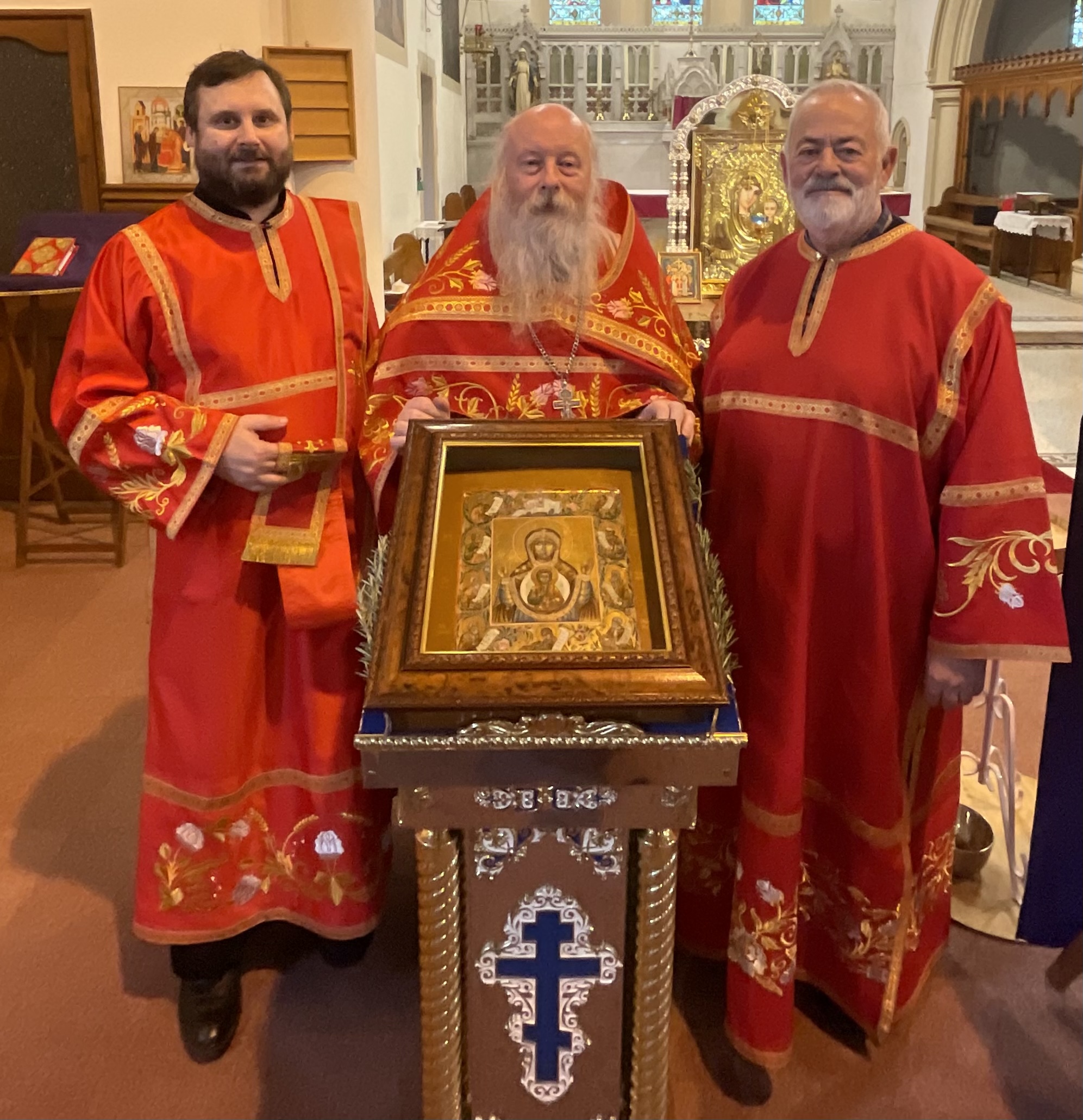
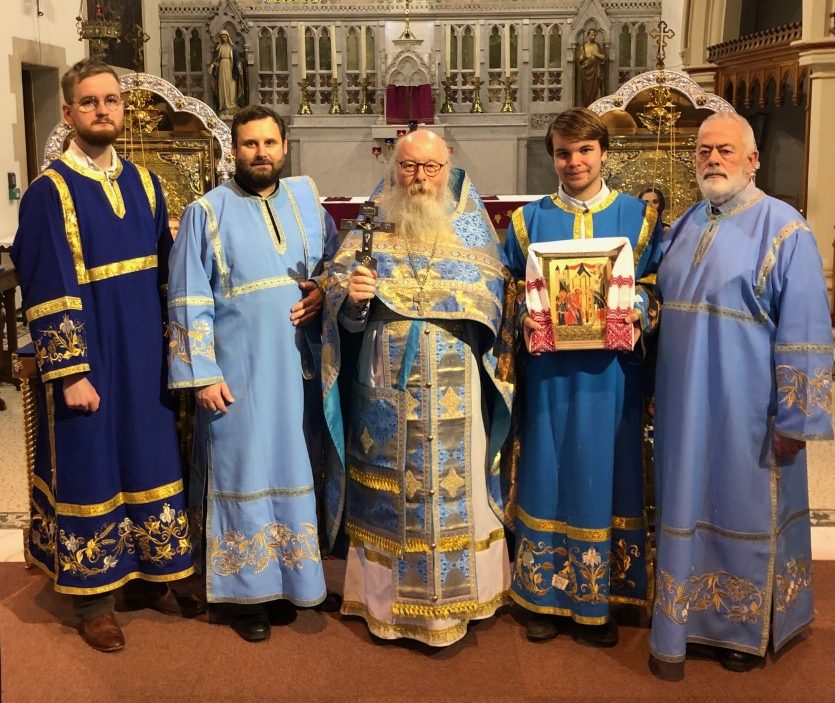 Dear brothers and sisters,
Dear brothers and sisters,
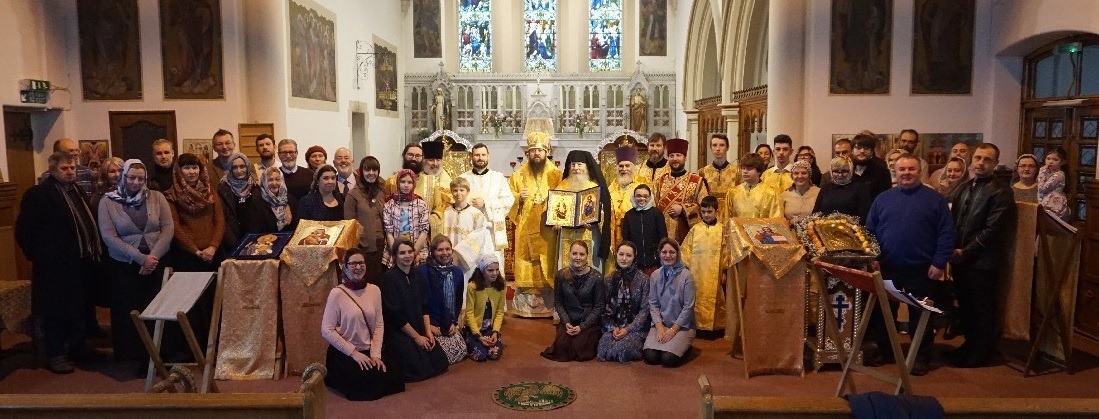
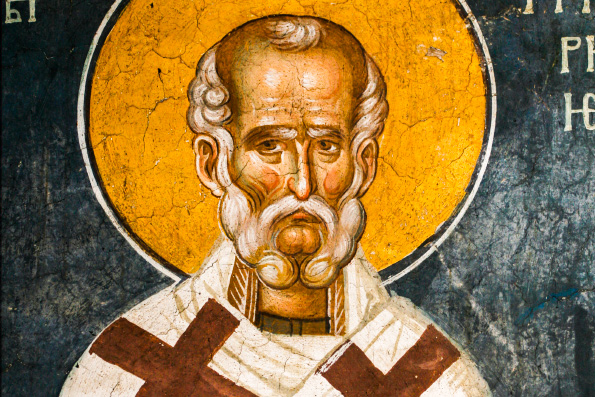

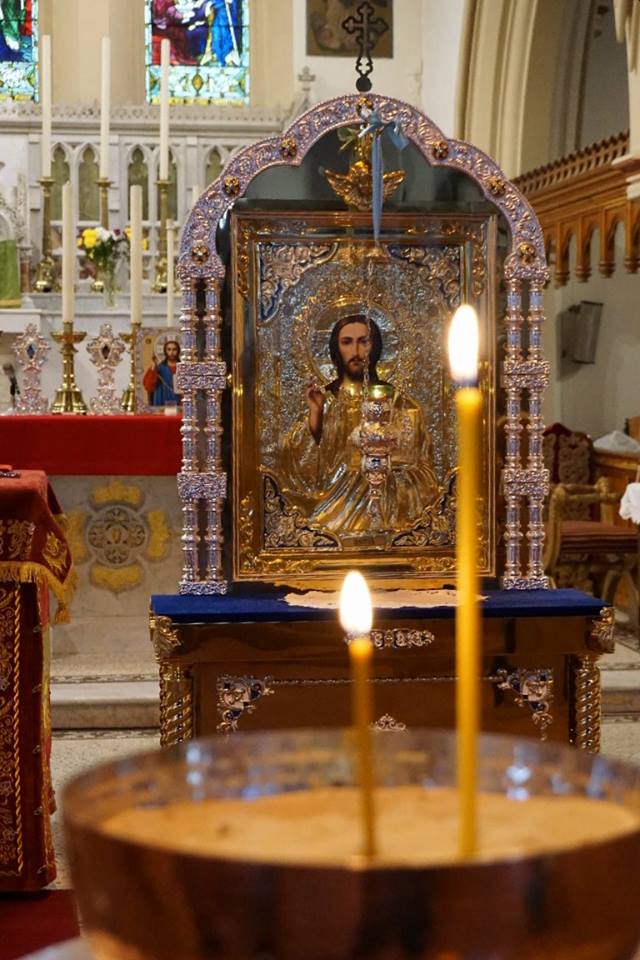
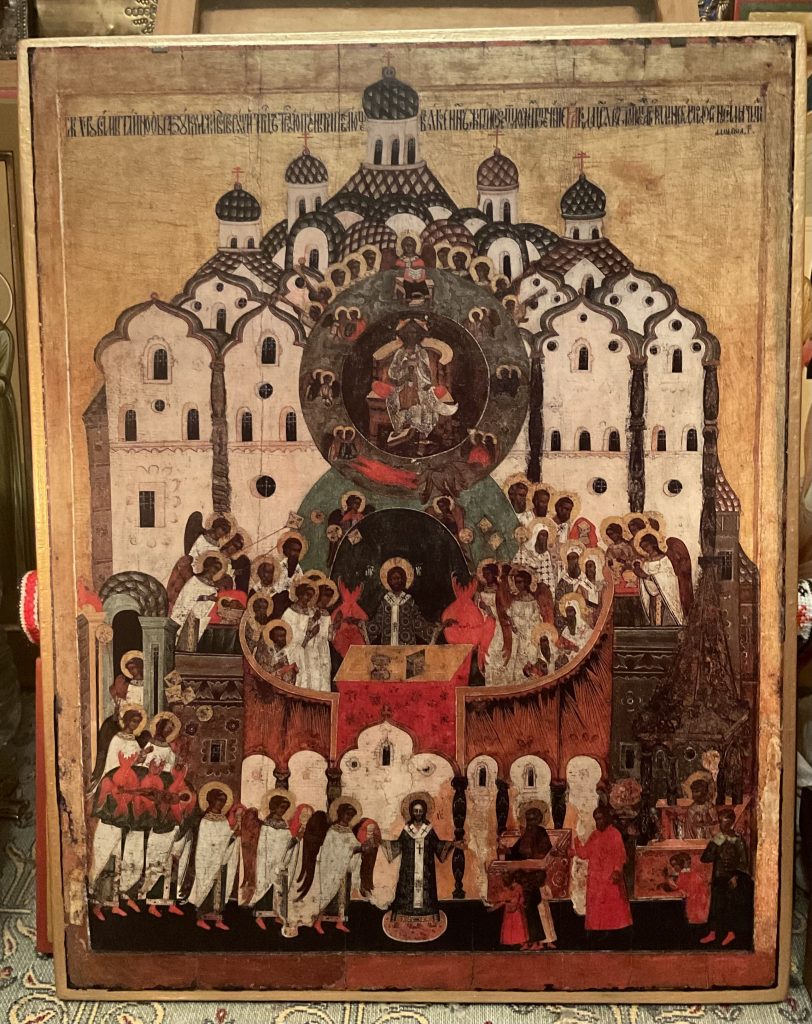 At the end of Liturgy, we sang Many Years for the newly ordained priest, Mark Tattum-Smith, a dear friend of many of us in the parish, who was ordained in the cathedral this morning. We also chanted mnogaya leta to our own Deacon Mark, who celebrated his third anniversary of ordination last Thursday. Many years, dear Fathers!
At the end of Liturgy, we sang Many Years for the newly ordained priest, Mark Tattum-Smith, a dear friend of many of us in the parish, who was ordained in the cathedral this morning. We also chanted mnogaya leta to our own Deacon Mark, who celebrated his third anniversary of ordination last Thursday. Many years, dear Fathers!
